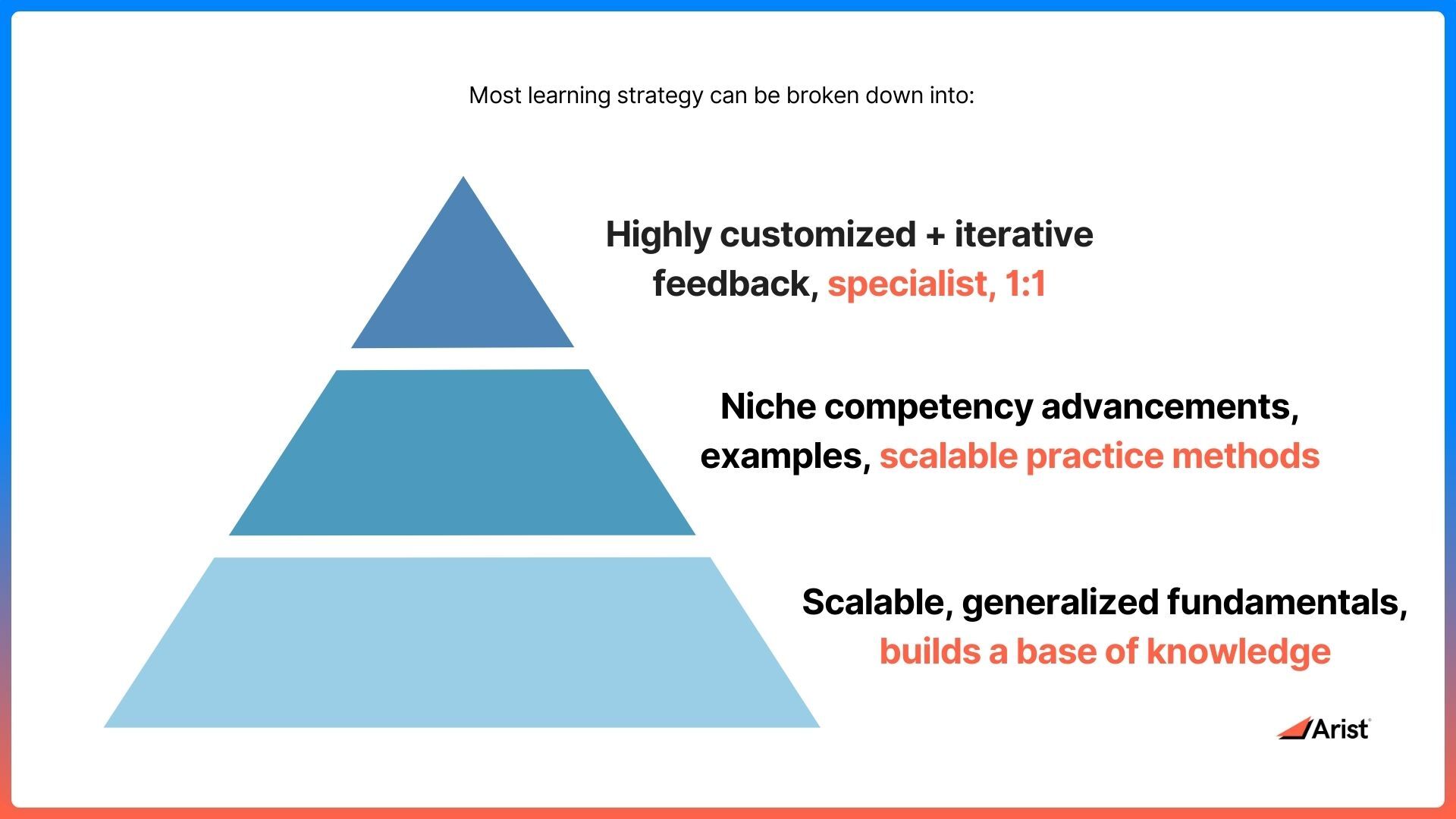Why Most Scaled Learning Fails (and How to Fix It)

Why does most scaled learning fail? At its core, teaching anyone anything effectively relies on three simple components:
1. Core Fundamentals: The foundational knowledge everyone needs to get started. This is highly scalable and often generic, setting a baseline understanding for all learners.
2. Particular Competency Advancements: Once fundamentals are in place, learners need to develop deeper, specialized skills. This involves exposure to expert examples, hands-on practice, and a focus on refining specific competencies.
3. High Iteration Feedback: This is the stage where specialists are built. It requires personalized coaching, detailed feedback loops, and mentorship to truly hone expertise.
The reason most learning programs fall short is rooted in poor resource allocation. Too often, we ask senior experts to teach foundational material, wasting their time and talents. Conversely, we over-rely on broad, scalable methods to develop specialists, leading to ineffective outcomes.
The Problem with Misaligned Resources
Take a typical sales kickoff event. Companies spend significant time and money to bring their entire salesforce together, only to use that valuable face-to-face time covering broad basics. Hours are spent rehashing company history, product overviews, and generalized market insights. By the end, there’s little energy or time left for specialized coaching or hands-on practice. For most sales teams, it’s a missed opportunity.
Modern sales training needs a more effective approach, one that optimally leverages available resources:
1. Mastering the Fundamentals
Every successful learning journey starts with mastering the basics. For a sales team, this might involve understanding the company’s core products, customer pain points, and key value propositions. Fundamentals are non-negotiable, but they don’t require extensive workshops, 1:1 sessions, or long meetings with senior experts.
Instead, use scalable, short-form, high-interval learning to drive mastery. Consider micro-courses delivered via SMS, quick-hit videos, or interactive e-learning modules that employees can access at their convenience. The goal is consistency and repetition—ensuring the basics are truly mastered without demanding extensive trainer time.
Example in Practice: For a SaaS company, reps could complete a series of short modules detailing product features, customer benefits, and sales scripts. These modules can be revisited periodically, keeping the fundamentals fresh.
2. Deepening Competency Through Immersion
Once the fundamentals are established, the next step is targeted skill development. This is where learners transition from basic knowledge to applying and refining their skills in real-world scenarios. For a sales team, this might involve analyzing recorded sales calls, studying top reps’ objection-handling techniques, or diving into detailed case studies that explore successful deals.
The focus is on tactical learning—exposing learners to excellence and giving them the chance to emulate it. Group workshops, peer discussions, and expert-led sessions can supplement this stage, creating a blend of observation and application.
Example in Practice: Consider a sales team workshop where reps analyze Gong call recordings of the company’s top performers. They can break down effective objection handling, practice responses in small groups, and share feedback with peers. By combining observation with active practice, the learning sticks.
3. High Iteration Feedback for Specialists
This is where true experts are made. High-iteration feedback involves personalized coaching, detailed feedback loops, and mentorship tailored to each learner. By this stage, learners have mastered the basics and gained a deeper understanding of key competencies. Now, they need 1:1 interactions that push them toward mastery.
For a sales team, this might involve senior reps or coaches reviewing recorded practice sessions, providing detailed critiques, and refining their techniques. The focus isn’t on broad feedback but on highly specific, actionable insights that drive improvement.
Example in Practice: A rep might receive feedback on their tone, phrasing, and response timing during a mock sales call. The coach would offer precise adjustments, watch the rep practice the change, and continue refining their approach until it’s second nature.
Protecting High-Value Resources: This level of coaching should be reserved for those who’ve earned it. There’s no value in using senior talent to teach the basics. High-touch feedback sessions must be targeted and impactful.
Why Most Programs Fall Short
In my experience—spanning 500+ conversations, 200+ learning programs, and countless hours of analysis—most organizations miss the mark by either squandering expert resources on introductory content or attempting to develop specialists with cookie-cutter training. Both strategies lead to subpar results.
Effective learning means aligning resources to the appropriate stages:
• Scalable methods to teach fundamentals consistently and efficiently.
• High-impact examples and workshops to deepen skills and encourage hands-on learning.
• Targeted coaching reserved for personalized, transformative feedback.
This isn’t just about sales training. The principles apply across any discipline where mastery matters. Whether it’s engineering, customer service, or leadership development, aligning your approach to these stages ensures the right impact.
Adapting Training to Fit Today’s Needs
Today’s fast-paced business environment demands a different approach to learning. For sales teams, the pressure of meeting quotas, adjusting to new product launches, and adapting to shifting market conditions requires a more agile, practice-driven training model.
The solution isn’t a flashy program or a one-size-fits-all approach. It’s building a system where:
• Repetition and reinforcement drive the fundamentals.
• Targeted, practical learning builds skill depth.
• Tailored feedback pushes high performers even higher.
Final Thoughts
Mastering the basics. Learning from the best. Then refining through expert feedback. That’s how great teams—and great learners—are built.
Content may change. The fundamentals of learning never do.
Ryan Laverty
Bring
real impact
to your people
We care about solving meaningful problems and being thought partners first and foremost. Arist is used and loved by the Fortune 500 — and we'd love to support your goals.
Curious to get a demo or free trial? We'd love to chat:


